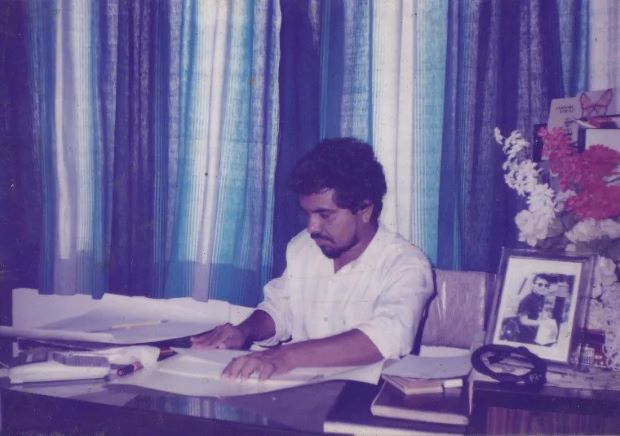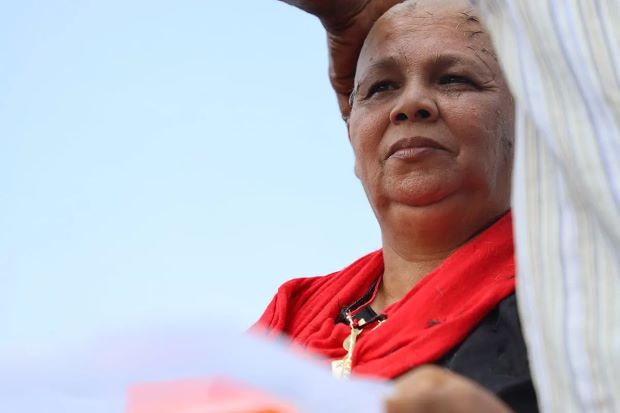14 years on, wife of missing Sri Lankan journalist Prageeth Ekneligoda fights for justice
By Sonali Dhawan
“I don’t know how long it will take, but I will get justice for my Prageeth,” Sandya Ekneligoda, wife of abducted Sri Lankan journalist and government critic Prageeth Ekneligoda, told CPJ via video call. It has been 14 years since Prageeth’s disappearance.
Prageeth, a then 50-year-old cartoonist and columnist for the news website Lanka e News was last seen by his family and colleagues in the suburbs of Sri Lanka’s capital Colombo on January 24, 2010, two days before elections that gave incumbent President Mahinda Rajapaksa a sweeping victory.
Dozens of journalists were murdered, assaulted, and intimidated throughout Rajapaksa’s presidency from 2005 to 2015, with violence often linked to media coverage of Sri Lanka’s 26-year civil war between the government and separatist Tamil Tiger rebels, which ended in 2009.
Mahinda Rajapaksa’s brother, Gotabaya, was defence secretary at the time and has been accused of involvement in multiple attacks on journalists, including Prageeth’s disappearance and the 2009 murder of Lasantha Wickrematunge. Gotabaya Rajapaksa has denied any involvement in these cases.
After the Rajapaksas were voted out in 2015, an investigation by the police Criminal Investigation Department (CID) found that a military intelligence unit abducted and most likely killed Prageeth. Nine military officials were served indictments on kidnapping and murder charges in November 2019, when Gotabaya Rajapaksa was elected president.
A commission of inquiry set up by Gotabaya Rajapaksa in 2020 issued a report recommending the acquittal of all accused in Prageeth’s case. A retired military officer and key witness who previously testified that he interrogated Prageeth at an army camp following the journalist’s disappearance later changed his testimony when he was summoned before the commission.
Gotabaya Rajapaksa resigned in 2022 and Prageeth’s case is the only ongoing prosecution regarding grave crimes against journalists in Sri Lanka, which local analysts say have never resulted in a conviction.
With a portrait of Prageeth hanging on the wall of their home, Sandya Ekneligoda spoke with CPJ about the obstacles in pursuing justice for her husband, her concern that the Rajapaksas are using their political connections to disrupt the prosecution of her husband’s case, and her hopes for the future as Sri Lanka is set for a presidential election later this year.

This interview has been edited for length and clarity.
QUESTION: Can you describe the months leading to your husband’s disappearance?
ANSWER: Prageeth was first abducted on August 27, 2009, and released on the 28th. [He told me] they threw him into a white van. They tied him to a pole and interrogated him while there was a bright light above his head so he could feel the unbearable heat. They refused to give him his diabetes and heart medication.
When they released him, they asked him to get down from the vehicle and sit down. He thought, “They are going to shoot me. This is going to be my last day.” They said, “Sit until you don’t hear the vehicle’s sound. Then, you can remove the blindfold and walk.”
Even though Prageeth filed a police complaint, no actions were taken. He received many anonymous calls. He took some security measures because he was being followed. He took different routes in the morning and evening. But Prageeth never stopped his work.
Q: What happened on January 24, 2010?
A: My two sons and I saw Prageeth in the morning before he went to his office. In the evening, we were supposed to attend a ‘bodhi puja’ [religious ceremony], so he wore the white shirt of our 15-year-old son. When he was wearing it, he was really happy and said, “Our son has grown up.” I can never forget what he said on that day.
Every day, I would call him around 9:15 p.m. I tried to call him three or four times but his mobile was switched off. I started to panic. My heart was pounding and I was shaking. I knew something was wrong because of what happened when he was abducted before.
When I went to the police station, they did not want to accept my complaint at first. The [officer-in-charge] said, “Your husband might still be at home. Why don’t you go look for him? These days, people are getting ‘abducted’ to get famous.”
Q: What has your journey to locate Prageeth looked like?
A: I believe no woman should go through what I have gone through. The first thing was hate speech, including from politicians and ministers. They said that I don’t cry, so it’s an act. The former attorney general went to the UNand said that Prageeth was living in another country.
In 2015, when the CID started to investigate, all of a sudden [rumours circulated that] Prageeth was a “terrorist.” But multiple government agencies said he did not have ties to any terrorist organization.
They started to paste posters in public areas, saying I was able to go to Geneva [the UN office where Sandya has advocated for her husband] by selling rice packets. Sometimes I was not allowed to sit in tuk-tuks and buses. There were shops that didn’t allow me to buy goods.
[When Prageeth disappeared], my elder son was 15 and my younger son was 12. It was a continuous struggle for me to look after my children’s well-being and fight for justice for my husband. Whenever I ensured my children were coming out of trauma, again another problem started.
Q: What would you like to see next in your fight for justice?
A: I will make sure I get justice through the judicial system. But the three-judge panel has repeatedly changed. One judge was transferred so one seat is vacant. Of the two remaining judges, one judge is a former brigadier and worked closely with the army. I have also requested the chief justice to change that judge.
Q: Are you concerned that the Rajapakas could still try to interfere in the case?
A: Even though the Rajapaksas have lost power, that doesn’t mean they have lost their [government] connections. None of them want to get the Rajapaksa family indicted in this case, so [those connections] will make sure to drag out [the proceedings] to protect this family.
Q: How would you like Prageeth to be remembered?
A: I want the world to remember Prageeth as someone who wrote about important issues and understood the responsibility of being a journalist. When others are talking about my Prageeth, it means he is still living in people’s hearts.
CPJ’s calls and WhatsApp messages to Gotabaya Rajapaksa’s aide Sugeeshwara Bandara and police spokesperson Nihal Thalduwa did not receive any replies. Ministry of Defence spokesperson Nalin Herath did not respond to CPJ’s emailed request for comment.
-Sonali Dhawan joined CPJ as an Asia researcher in 2021. Previously, she served as a program officer with the American Bar Association Centre for Human Rights and worked with Save the Children, Human Rights Watch, and Amnesty International USA



Comments are closed, but trackbacks and pingbacks are open.